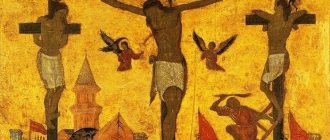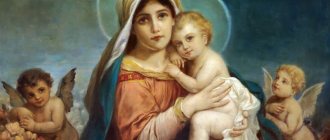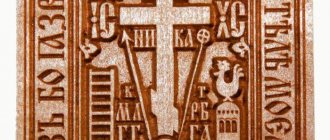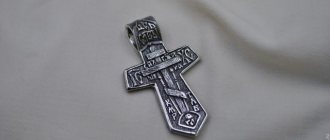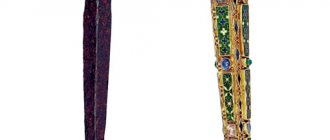seven manifestations of Jesus during his crucifixion
Crucifixion from the cross
by James Tissot, c. 1890.
The Sayings of Jesus on the Cross
(sometimes called
the Seven Last Words of the Cross
) are seven expressions that are biblically attributed to Jesus during his crucifixion. Traditionally, short sayings are called “words.” They are collected from the four Canonical Gospels.[1][2] Three sayings appear only in the Gospel of Luke and two only in the Gospel of John. Another saying appears in both the Gospel of Matthew and the Gospel of Mark, and another is only directly quoted in John but mentioned in Matthew and Mark.[3] In the Gospels of Matthew and Mark, Jesus calls out to God. In Luke, he forgives his murderers, comforts a repentant thief, and praises his spirit to the Father. In "John" he speaks to his mother, says he is thirsty, and announces the end of his earthly life.
A person's final articulated words spoken before death or as death approaches usually have special meaning. These seven sayings, as “last words,” can provide a way to understand what was ultimately important to this man dying on the cross.[4] The paucity of sayings recorded in the biblical narratives suggests that Jesus remained relatively silent throughout the hours he hung there.[5]
They have been widely used in Good Friday sermons since the 16th century, and entire books have been written on their theological analysis.[3][6][7][8] The seven last words of the cross are an integral part of liturgy in Anglican, Catholic, Protestant, and other Christian traditions.[9][10]
The tradition of the seven sayings is an example of the Christian approach to constructing gospel harmony in which material from different gospels is combined to produce a narrative that extends beyond each gospel.[3][11] Several composers have set sayings to music.
Content
- 1 Seven sayings 1.1 1. Father, forgive them; because they don't know what they are doing
- 1.2 2. Today you will be with me in heaven
- 1.3 3. Woman, behold, your son! Look, your mother!
- 1.4 4. My God, my God, why have you forsaken me?
- 1.5 5. I'm thirsty
- 1.6 6. Done
- 1.7 7. Father, into your hands I commend my spirit.
My God! Why did you leave me?
Fourth saying: “My God, My God! Why have you forsaken me? (Matt 27:46) These words speak not only of human weakness, but also of the foresight of the Lord. For man suffers, but under human pain there is one secret hidden. Only these words were able to destroy the heresy that shook the Church several centuries later: it falsely taught that the Divine suffered on the Cross. Meanwhile, the eternal Son of God became human in order to suffer both in body and soul for people and die for them as a man. For if the Divinity suffered in Christ, it means that the Divinity died in Christ. And this is impossible. Think as deeply as possible into these great and terrible words: “My God! My God! Why have you forsaken me? [2].
Crucifixion with holidays and saints in the fields. Gospel cover. Bulgaria. XVI century
Seven sayings
The seven sayings form part of a Christian meditation that is often used during Lent, Holy Week and Good Friday. Traditional order of sayings:[12]
- Luke 23:34: Father, forgive them, for they do not know what they are doing.
- Luke 23:43: Truly, I tell you today, you will be with me in Paradise.
- John 19:26–27: woman! Here is your son. (Says to the student) Here is your mother.
- Matthew 27:46 and Mark 15:34: My God, my God, why have you forsaken me?
- John 19:28: I thirst.
- John 19:30: Done.
- Luke 23:46: Father! I commend My spirit into Your hands.
Traditionally, these seven sayings are referred to as: 1. Forgiveness, 2. Salvation, 3. Relationship, 4. Rejection, 5. Disaster, 6. Triumph, and 7. Reunion.[13]
As noted in the list above, not all seven sayings can be found in any one account of Jesus' crucifixion. The order is a harmonization of the texts of each of the four canonical gospels. In the Gospels of Matthew and Mark, Jesus is quoted in Aramaic, shouting the fourth phrase.. In the Gospel of Luke, the first, second and seventh sayings occur. The third, fifth and sixth sayings are found only in the Gospel of John. In other words:
- In Matthew and O
- “Father, forgive them, for they do not know what they are doing.”
- “Woman, look at your son; look to your mother" (directed at Mary, the mother of Jesus, either as a reference to himself, or as a reference to the beloved disciple and admonition to the disciple himself)
1. Father, forgive them; because they don't know what they are doing
Luke 23:34
Then said Jesus, Father, forgive them; for they do not know what they are doing.
This first utterance of Jesus on the cross is traditionally called the “Word of Forgiveness.”[13] Theologically, this is interpreted as Jesus' prayer for forgiveness for the Roman soldiers who crucified him and all others who participated in his crucifixion.[14][15][16][17]
Some early manuscripts do not include this sentence in Luke 23:34.[18]
2. Today you will be with me in heaven
Luke 23:43
“And he said to him, “Truly I tell you, today you will be with me in paradise.”
This saying is traditionally called the “Word of Salvation.”[13] According to the Gospel of Luke, Jesus was crucified between two thieves (traditionally called Dismas and Gesta), one of whom supports Jesus' innocence and asks him to remember him when he enters his kingdom. Jesus responds: “Truly I say to you...” (ἀμήν λέγω σοί, amen legō soi
listen)) with the only appearance of the word "paradise" in the Gospels (παραδείσω,
paradeisō
, from Persian
Pairidaeza
"garden of Eden").
The seemingly simple change in punctuation in this statement has become a matter of doctrinal differences between Christian groups, given the lack of punctuation in the original Greek texts.[19] Catholics and most Protestant Christians usually use the version that says, "Today you will be with me in heaven."[19] This reading assumes a direct journey to Heaven and has no consequences. purgatory.[19] On the other hand, some Protestants who believe in soul sleep have used a reading that emphasizes, “I tell you today,” leaving open the possibility that the announcement was made today but the arrival in Heaven may be later.[19]
3. Woman, look, your son! Look, your mother!
Crucifixion depicted as Stabat Mater
with the Virgin Mary, Porto Alegre, Brazil, 19th century.
John 19:26–27
So when Jesus saw his mother and the disciple he loved standing next to him, he said to his mother, “Woman, behold your son!” After this, he said to the disciple: “Son, here is your mother!” And from that hour this disciple took her into his house.
This statement is traditionally called the “Word of Relationship,” and in it Jesus entrusts Mary, his mother, to the care of “the disciple whom Jesus loved.”[13]
Methodist minister Adam Hamilton's 2009 interpretation: “Jesus looked up from the cross and saw his mother standing nearby. As far as we know, only one of the twelve apostles was at the foot of the cross: “the disciple whom Jesus loved,” usually called John. Naked and in terrible pain, he thought not of himself but of his mother's well-being after his death. This shows the humanity of Jesus and the depth of love he felt for his mother and the disciple in whose care he entrusted her."[4]
4. My God, my God, why have you forsaken me?
“My God, my God, why have you forsaken me?” redirects here. For the film, see: My God, My God, Why Have You Forsaken Me? (movie).
See also: Language of Jesus # Eli, Eli, lema sabachthani (Ἠλί, ίλ λ, λιμὰ σαβαχθανί)
Matthew 27:46
And about the ninth hour Jesus exclaimed loudly: “Or, Eli, Lama Sabahtani?” that is, “My God, my God, why have you forsaken me?”
Mark 15:34
And at the ninth hour Jesus exclaimed loudly: “Eloi Eloi lama sabachthani?” which means: “My God, my God, why have you forsaken me?”
This is the only saying that appears in more than one Gospel:[13] and it is a quotation from Psalm 22:1 (or perhaps Psalm 43:9). Some perceive this statement as the abandonment of the Son by the Father. Another interpretation states that the moment Jesus took upon himself the sins of mankind, the Father had to turn away from the Son because the Father “has purer eyes than to see evil, and cannot look upon evil” (Habakkuk 1:13). Other theologians understand this cry as the cry of one who was truly human and felt abandoned. Killed by his enemies, mostly abandoned by his friends, he may have felt abandoned by God.[20]
Others point to this as the first words of Psalm 23 and suggest that Jesus read these words, perhaps even the entire psalm, “that he might show himself to be the very Being to whom these words refer; so that the Jewish scribes and people could examine and see the reason why he did not come from the cross, namely, because in this very psalm it was said that he must suffer this.”[21]
Theologian Frank Stagg points to what he calls "the mystery of the incarnation of Jesus": "... he who died on Calvary (Calvary) is one with the Father, that God was in Christ and at the same time he cried out to the Father."[22 ]
In Aramaic the phrase was/is translated as "אלי אלי למה שבקתני".
While "the nails in the wrists press on the greater median nerve, and the severely damaged nerve causes excruciating pain," the lamb of God experiences the rejection of the soul by God, a deeply excruciating pain that "is the essence of eternal damnation."[23]
I crave
John 19:28
"He said, 'I'm thirsty.'"
This statement is traditionally called the "Word of Distress" and is compared and contrasted with Jesus' encounter with the Samaritan woman at the well in John 4:4–26.[13]
As in other accounts, the Gospel of John says that Jesus was offered to drink sour wine, adding that the man placed a sponge dipped in wine on a hyssop branch and brought it to Jesus' lips. Hyssop branches played an important role in the Old Testament and are mentioned in the New Testament. Letter to the Jews.[24]
John interprets this statement of Jesus as the fulfillment of the prophecy given in Psalm 69:21, “... And because of my thirst they gave me vinegar to drink
,[25] Therefore, the quotation from the Gospel of John includes the comment “to fulfill the scriptures.”
In Jerusalem Bible Cross-References Psalm 22:15: My palate is dryer than a potsherd, and my tongue is stuck to my jaw
.[26]
Finished
John 19:30
"Jesus said, 'It is finished.'" (τετέλεσται or
Tetelestai
in Greek).[27]
This statement is traditionally called the "Word of Triumph" and is theologically interpreted as an announcement of the end of Jesus' earthly life in anticipation of the Resurrection.[13]
Adam Hamilton writes: “These last words are taken as a cry of victory, not oblivion. Jesus completed what He came to do. The plan was carried out; salvation became possible; love shown. He took our place. He demonstrated both the brokenness of humanity and the love of God. He offered himself completely to God as a sacrifice for humanity. When he died, it was all over. With these words, the noblest man who ever walked the face of this planet, God in the flesh, breathed his last."[4]:112
The verse has also been translated as “It is finished.”[28] In business documents or receipts, it is used to indicate "The debt has been repaid in full."[29]
The saying after consuming the drink and just before his death is mentioned, but not explicitly quoted, in Mark 15:37 and Matthew 27:50 (both of which say that he "cried out with a loud voice and gave up the ghost").
Father, into your hands I commend my spirit
Luke 23:46
“And when Jesus cried with a loud voice, he said: Father! Into Your hands I commend My spirit":
From Psalm 31:5, this utterance, which is an announcement rather than a request, is traditionally called the "Word of Reunion" and is theologically interpreted as a proclamation of Jesus joining God the Father in paradise.[13]
Hamilton wrote that “When darkness seems to prevail in life, it requires faith even to talk to God, even if it is to complain to him. These last words of Jesus from the cross show his absolute trust in God: “Father, in Your hands I praise my spirit: ... “This has been called a model prayer for all who are afraid, sick or facing their own death. Essentially he says:
I commit myself to You, O God. In my life and in my death, in good times and bad, whatever I am and whatever I have, I commit into your hands, O God, for your safety.[4]:112
Wife! Behold, Your son. Behold, your Mother
Third saying: “Woman! Behold, Your son" (John 19:26). This is what the Lord said to His Holy Mother, who stood under the Cross with her “crucified” soul. And He said to the Apostle John: “Behold, your mother” (John 19:27). In these words is His filial care, obligatory for everyone in relation to their parents. For God gave people the commandment: “Honor your father and your mother” (Ex. 20:12), and He Himself fulfills it until the last hour.
Byzantine icon of the 14th century. Istanbul.
Other interpretations and translations
Michelangelo: The Crucifixion of Christ
, 1540
The saying “My God, my God, why have you forsaken me” is usually given in transliteration. Aramaic with translation (originally into Greek) thereafter. This phrase is the beginning of Psalm 22, a psalm about persecution, mercy and salvation of God. At the time, people often referred to songs by quoting their opening lines. In the verses immediately following this statement in both Gospels, audiences who hear Jesus' cry understand that he is calling for help from Elijah (Elias). The slight differences between the two gospel accounts are most likely due to dialect. Matthew's version seems to rely more on Hebrew, while Mark's is perhaps more colloquial.
The phrase can be either:
- אלי אלי למה תני [ēlî ēlî lamâ azavtanî]; or
- אלי אלי למא תני [ēlî ēlî lamâ šabaqtanî]; or
- אלהי אלהי למא שבקתני [ēlâhî ēlâhî lamâ šabaqtanî]
In the first example above, the word "עזבתני" is translated not as "forsaken" but as "forsaken", as if appealing to the fact that God left him to die on the cross or walked away and left him alone in his time of greatest pain and suffering .
The Aramaic word šabaqtanî is based on the verb šabaq, 'allow, allow, forgive and leave', with the perfect tense ending -t (2nd person singular: 'you') and the object suffix -anî (1st person singular: " I").[34]
A. T. Robertson, and Ransom realizes with shock that his opponent is not quoting the New Testament, but directly recalls that he was present at the Crucifixion and looked at him maliciously. The Agony of Jesus. This enrages Ransom and confirms that he overcomes his doubts and fights the demon with all his might.
Popular culture[edit]
Further information: Musical settings of the sayings of Jesus on the cross.
- Michael Moorcock's science fiction novel Behold Man
suggests that Jesus was a time traveler from the 20th century and that in his agony on the cross he exclaimed in English:
"This is a lie... This is a lie... This is a lie."
lie” , which Aramaic-speaking viewers misinterpreted as words enshrined in the text of the New Testament.
[ citation needed
] - In the novel by K.S. Lewis's Perelandra,
the protagonist Ransom faces a demonically possessed adversary.
In the midst of their confrontation, the demon repeats the words of Jesus: “Eli, Eli, lema sabachthani,” and Ransom realizes with shock that his opponent is not quoting the New Testament, but directly remembers that he was present at the Crucifixion and looked at him with malicious joy. The Agony of Jesus. This enrages Ransom and confirms that he overcomes his doubts and fights the demon with all his might. [ citation needed
] - System of a Down's 2001 song, Chop Suey! references: “Father, into your hands I commend my spirit” (Luke 23:46) and “Why have you forsaken me?” (Mark 15:34 and Matthew 27:46). [40]
Historicity
James Dunn considers the seven sayings to have weak roots in tradition, and sees them as part of developments in various retellings of the last hours of Jesus' life.[36] Dunn, however, argues that the authenticity of the Mark/Matthew saying is that by presenting Jesus as "forsaken", it would have been an embarrassment to the early church, and therefore would not have been invented.[36] Geza Vermes argues that the first statement from (Matthew and Mark) is a quotation from Psalm 22, and is therefore sometimes seen as a theological and literary device used by the writers.[37] According to Vermes, attempts to interpret the expression as a reassuring reference to Scripture are indirect evidence of its authenticity. [38] Leslie Holden, on the other hand, states that Luke may have deliberately excluded the Matthew/Mark saying from his Gospel because it did not fit the model of Jesus that he presented.[3][7]
The last days of the life of Jesus Christ
Before delving into the words that Jesus Christ spoke, we need to remember that he was condemned by three courts. The charge was serious - for equating oneself with God.
From the age of 30, Christ served the people - he preached Christian teaching, healed people, which is associated with many miraculous stories, and more and more people followed him.
According to the Jews, no one could call himself the Son of God, be higher than the King and have a strong influence on the people.
Julius KAROLSFELD. Jesus before Caiaphas. Matthew 26:57-66
Jesus was betrayed by one of his followers, Judas, captured, subjected to several trials: by the Sanhedrin - the supreme court - and ultimately condemned by the procurator Pontius Pilate and the people to execution on Mount Calvary.
Notes
- Jeffrey W. Bromiley, International Standard Bible Encyclopedia
, Eerdmans Press 1995, ISBN 0-8028-3784-0 item 426 - Joseph F. Kelly, An Introduction to the New Testament for Catholics
Liturgical Press, 2006 ISBN 978-0-8146-5216-9 para. 153 - ^ a b c d Jesus: The Complete Guide
by Leslie Holden, 2006 ISBN 0-8264-8011-X p. 627 - ^ a b c d
Hamilton, Adam.
24 hours that changed the world
. Abingdon Press, 2009. ISBN 978-0-687-46555-2 - Wilson, Ralph F. "The Seven Last Words of Christ from the Cross." https://www.jesuswalk.com/7-last-words/>
- Jesus of Nazareth by
W. McCrocklin, 2006 ISBN 1-59781-863-1 p. 134 - ^ a b Jesus in History, Thought and Culture: An Encyclopedia, Volume 1
James Leslie Holden, 2003 ISBN 1-57607-856-6 p. 645 - Seven Last Words from the Cross
Fleming Routledge 2004 ISBN 0-8028-2786-1 pp. 8–10 - Richard Young (25 February 2005). Echoes of Calvary: Reflections on Franz Joseph Haydn's The Seven Last Words of Christ, Volume 1
.
Rowman and Littlefield. ISBN 978-0742543843. Retrieved April 1, 2012. Interestingly, the Methodist Book of Worship
adopted by the 1964 General Conference featured two services on Good Friday: a three-hour afternoon service and an evening Good Friday service that included "Adoration of the Cross" (Gospel, Denial and Adoration of the Cross ) omits the communion service, which would be the Methodist equivalent of the Mass of the Presanctified. - Encyclopedia Americana: Library of Universal Knowledge, Volume 13
. Encyclopedia Americana. 1919. Received April 1, 2012. The devotion of the "Three Hours", borrowed from Roman usage, with meditation on the "seven last words" from the Cross and held from 12 to 3, when our Lord hung on the Cross, is the Good Friday service that welcomes an ever increasing number of times. recognition among Anglicans. - Ehrman, Bart D.. Jesus, Interrupted, HarperCollins, 2009. ISBN 0-06-117393-2
- Jan Majernik, The Forecasters
, Emmaus Road Press: 2005 ISBN 1-931018-31-6, paragraph 190 - ^ a b c d f g hr International Standard Bible Encyclopedia
Geoffrey W. Bromiley, 1988 ISBN 0-8028-3785-9 p. 426 - Vernon K. Robbins in Literary Studies in Luke-Acts
Richard P. Thompson (ed.) 1998 ISBN 0-86554-563-4 pp. 200–01 - Mercer Bible Dictionary
Watson E. Mills, Roger Aubrey Bullard 1998 ISBN 0-86554-373-9 p. 648 - Reading Luke-Acts: The Dynamics of the Biblical Narrative
William S. Kurtz 1993 ISBN 0-664-25441-1 p. 201 - Luke's Exposition of Jesus: Christology
to de: Robert F. O'Toole 2004 ISBN 88-7653-625-6 n. 215 - Stephen L. Cox, Kendell H. Easley, 2007 Harmony of the Gospels
ISBN 0-8054-9444-8 p. 234 - ^ a b c d Blackwell's Companion in Catholicism
James Buckley, Frederick Christian Bauerschmidt and Trent Pomplan, 2010 ISBN 1-4443-3732-7 p. 48 - Conner, W.T. The Cross in the New Testament
. Nashville: Broadman Press, 1954. AS IN B0007EIIPI para. 34 - "Department Commentary". See Mark 15:34, https://biblehub.com/commentaries/pulpit/mark/15.htm
- Stagg, Frank. New Testament Theology
. Broadman Press, 1962. ISBN 0-8054-1613-7 - "Seven words from the cross (reflection)." Ukrainian Orthodox Greek Catholic Church
. February 28, 2011 Archived from the original on August 13, 2018. - Hyssop. Wed Exodus 12:22: used to sprinkle the blood of the Passover lamb over the doors of the Israelites' dwellings when the firstborn of Egypt were killed; Leviticus 14: Hyssop wrapped in yarn was used to sprinkle blood and water on lepers; Leviticus 14: Hyssop wrapped in yarn is also used for the ceremonially unclean so that they can become clean again; Psalm 51:7: David in his confessional prayer cried out to God: “Cleanse me with hyssop, and I will be clean”; and Hebrews 9:19–20: After Moses had given the people the Ten Commandments, he took the blood of bulls and goats with water, red wool, and hyssop, and sprinkled both the scroll itself and all the people, saying, “This is the blood of the covenant, which God has appointed for you.'" Hamilton, Adam (2009). 24 hours that changed the world
. Nashville: Abingdon Press. ISBN 978-0-687-46555-2. - Nicholl, W.R., Greek evidence of the exhibitor of 19 John, accessed May 15, 2022.
- Jerusalem Bible (1966): Psalm 22:15
- https://bible.org/question/what-does-greek-word-tetelestai-mean
- "John 19:30." Bible of Douay-Rheims. Therefore Jesus, having drunk the vinegar, said, It is ready. And, bowing his head, he gave up the ghost.
- Milligan, George. (1997). Dictionary of the Greek Testament
. Hendrickson. ISBN 1-56563-271-0. OCLC 909241038. - David Anderson-Berry, The Seven Sayings of Christ on the Cross
, Glasgow: Pickering & Inglis Publishers, 1871. - Arthur Pink, Seven Sayings of the Savior on the Cross
, Baker Books 2005, ISBN 0-8010-6573-9 - Simon Peter Long, The Wounded Word: A Brief Meditation on the Seven Sayings of Christ on the Cross
, Baker Books, 1966. - Timothy Radcliffe, 2005 Seven Last Words
, ISBN 0-86012-397-9 p. 11 - Dictionary of Biblical Traditions in English Literature
David L. Jeffrey 1993 ISBN 0-8028-3634-8 p. 233 - Robertson's Word - New Testament Images
(Broadman-Holman, 1973), vol. 1. ISBN 0-8054-1307-3. - ^ a b
James G. D. Dunn,
Jesus Remembered
, Eerdmans, 2003, pp. 779–81. [
ISBN missing
] - Geza Vermes, Passion
, Penguin 2005, p. 75. [
ISBN missing
] - Vermes, Geza. The Real Gospel of Jesus
.
London, Penguin Books. 2004[ ISBN missing
][
page needed
]
I'm thirsty
Fifth saying: “I thirst” (John 19:28). His Blood was poured out. This causes thirst. The sun from the west hit Him in the face and, aggravating His suffering, made it terribly hot. Naturally, He was thirsty, but, Lord, what did You truly thirst for: water or love? Have you thirsted as a man or as God, or as both man and God? Here he is, a Roman legionary who gave You a sponge soaked in vinegar. The drop of “mercy” that You received from people during three hours of torment on the Cross! This Roman soldier somehow mitigates Pilate's sin, the Roman Empire's sin against You, even if it was vinegar. For this you will destroy the Roman Empire, but in its place you will create a new one [3].
